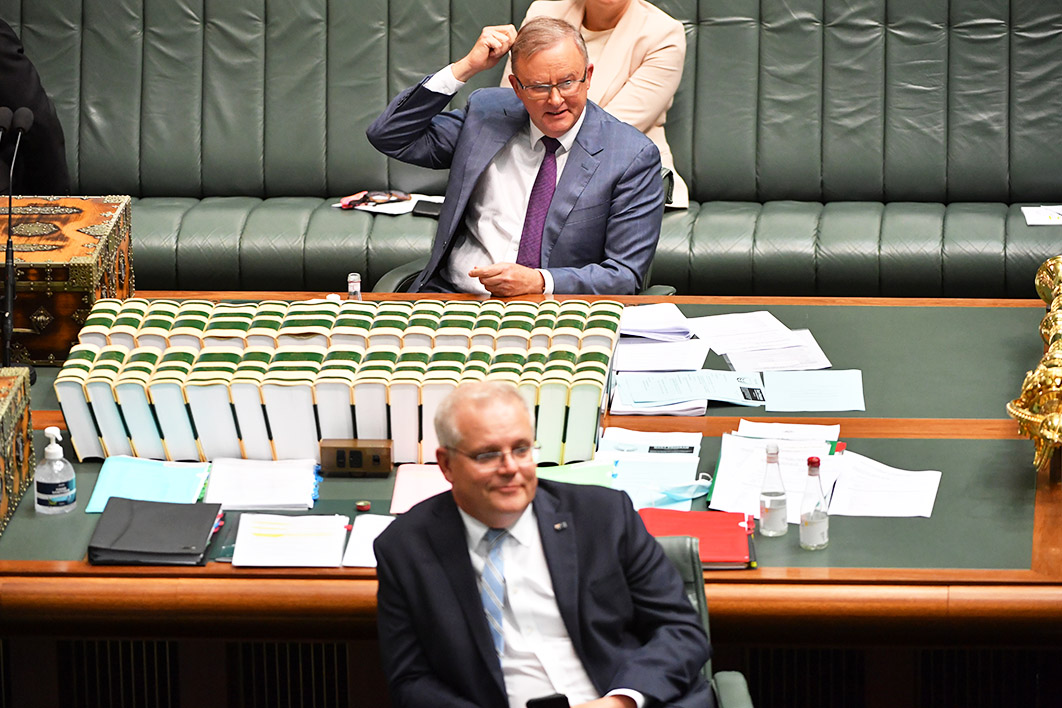If there’s one thing economists love, it’s competition. Competition between firms boosts wages and creates jobs. It reduces inequality and the cost of living. It spurs investment, innovation and ingenuity. Without competition, economies don’t function properly.
The same is true for political systems. Competition between political parties is what drives alternative visions for the country. It’s what drives economic reform. But at the moment, sadly, there is too little competition between the major political parties when it comes to economic policy. And when there is competition, it’s often in the wrong direction.
Take fiscal policy. More than five people are unemployed for every vacant job in Australia. Basic economics suggests that now would be an unwise time to cut back government spending. And yet the government is planning one of the largest fiscal withdrawals in Australian history by ending JobKeeper, despite more than 1.5 million Australians still receiving the payment between October and December 2020 according to the latest figures.
The government’s thinking is straightforward, but risky. Based on a single quarter of data, it is placing a big bet that households and firms will unleash the billions of dollars they’ve saved during the pandemic and lockdowns.
The problem is that the first quarter of economic data after a downturn is always big and positive. It’s what happens after that (with less immigration, fewer tourists and less Chinese demand for our exports) that will reveal the strength of the recovery. Households and firms might prefer to save than spend, particularly if most of the saved money is held by rich people or if the premature withdrawal of JobKeeper is what kills off that spending in the first place. And even if households and firms do spend, it won’t be spread evenly.
Rather than offer an alternative to this cut in spending, Labor has endorsed it. Anthony Albanese has instructed his shadow cabinet to offset any new spending with cuts elsewhere. Implicitly, this means Labor has adopted a fiscal rule whereby it will match the aggregate spending of the government. If the government spends less, so will Labor.
Offsetting spending might make sense for recurrent spending, like the funds for a new social welfare program. But it makes little sense for one-off spending on infrastructure, for instance, which has productivity-boosting effects that easily offset the current, very low financial and economic cost of government borrowing.
We see the same race to the bottom on productivity-enhancing reform. It is now safe to conclude that the government isn’t going to use the Covid-19 crisis as an opportunity to introduce meaningful economic reforms. This is a tragedy. And when Labor’s Richard Marles was asked by David Speers on Insiders whether we should expect bold reform from Labor on tax, industrial relations, energy or the federation, the answer was not promising. “Australians want stability and security,” said Marles. “So, don’t expect too much reform from Labor?” asked Speers. “I think that’s where we’re at,” said Marles.
Trade is suffering the same fate. The government’s rhetorical commitment to boost domestic manufacturing and onshore supply chains is economically unwise and probably in breach of our international obligations, yet it appears to have been wholly adopted by Labor through its rhetoric on advanced manufacturing and needing to be a country that makes things. The question neither party has been willing to answer is: how do you plan to achieve this? Two tools are available — tariffs and subsidies — and both are equally bad ideas economically and legally.
The whole point of trade is it allows countries to specialise; it allows Australia to focus its scarce labour and capital resources to produce the things we are good at, that earn us a lot of money, and import the rest. By definition, “supporting” a preferred industry — whether through tariff or subsidy — means diverting resources away from industries in which we already have an international advantage towards industries in which we don’t.
Not only is this a great way to make Australia poorer, the mechanisms that achieve this outcome have brutal trade-offs: tariffs are a tax on your own citizens that hurt poor households the most, while subsidies are extremely expensive, wreak havoc and are eventually withdrawn anyway. Both are almost certainly illegal under our World Trade Organization obligations, undermining the very framework Australian businesses rely on to do business overseas. It’s a particularly unusual argument from Labor given that the bulk of Australia’s trade liberalisation, which has substantially increased living standards, took place under Labor governments.
Climate change is no different. The cheapest and most effective way to reduce carbon emissions is to establish a market price on carbon. While policies might change regularly on climate change, the economic reality does not. Yet the government has ruled out any policy that could be characterised as a tax, which presumably rules out any price mechanism whatsoever.
Again, Labor is under pressure internally to adopt whatever policy the government produces to avoid political heat, meaning that an expensive and ineffective response to climate change awaits, regardless of who wins the next election. Australia could use climate change policy strategically to bolster its relationships in Asia, repair its relationship with China and strengthen its relationship with newly elected US president Joe Biden. Australia’s lack of credibility on the topic undermines all three.
The notion that a lack of reform boosts confidence is entirely backwards. Consumer and business confidence is bolstered by well-designed, well-communicated economic reform. Politicians who promise a return to the pre-Covid economy appear to forget what the pre-Covid economy was like: low wages, declining investment, stagnant living standards, rising inequality and rising carbon emissions.
With less immigration, tourism and less demand from China, a promise to do nothing on economic reform, fiscal policy, trade and climate change means a promise to return to a worse version of the pre-Covid economy. The major political parties need to unleash their competitive spirits. Australia can do better. •




